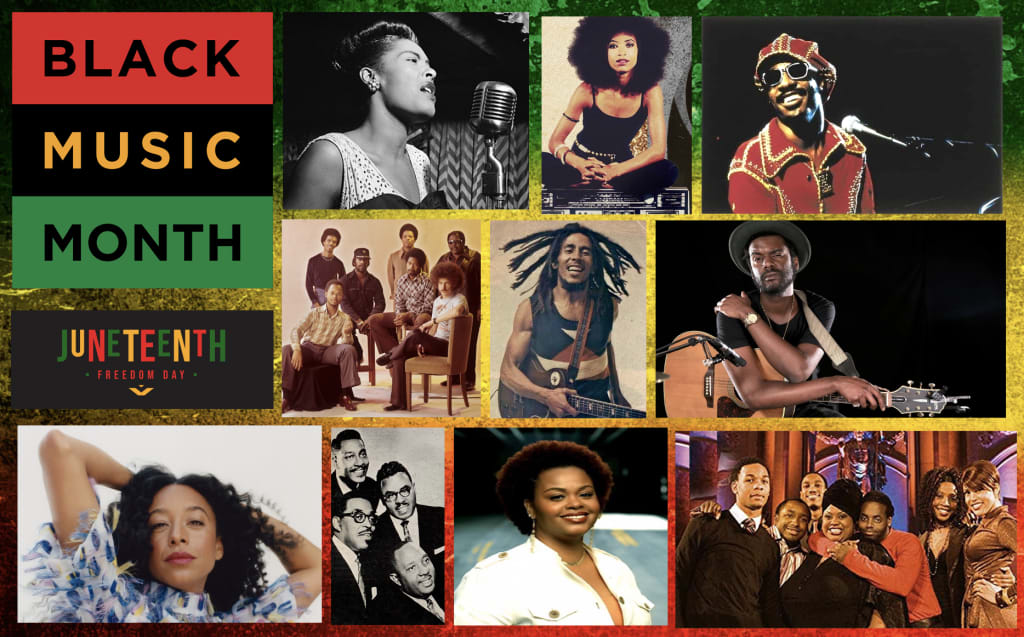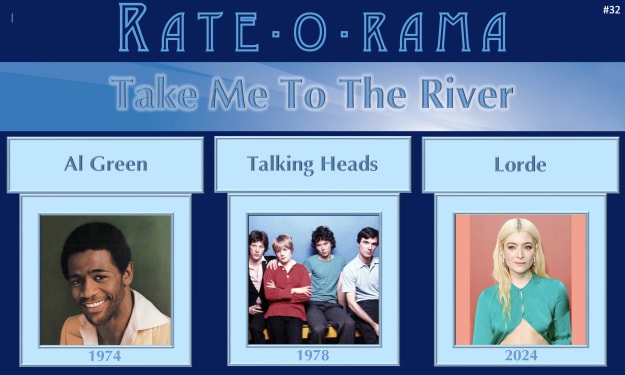Celebrating Black Music Month
Timeless Songs With A Message

This year I choose to celebrate Black Music Month by sharing a bit of its history and a few songs I feel speak to the varying human conditions of black people living in the United States.
The following is a Proclamation on Black Music Month, 2023
(This proclamation comes directly from the official White House website whitehouse.gov )
During Black Music Month, we pay homage to legends of American music, who have composed the soundtrack of American life. Their creativity has given rise to distinctly American art forms that influence contemporary music worldwide and sing to the soul of the American experience.
Much of Black music is rooted in African rhythms, coupled with the experience of slavery and struggle in America. Barred from expressing themselves in their native tongues, enslaved people developed a language to articulate their hopes, dreams, sense of loss, and tenacity to overcome the harrowing nature of their lives. They used music to strategically and creatively voice their most deeply held feelings. Today, the creative ways that Black music tells stories of trial and triumph in American life continue to move us all to understand the common struggles of humanity. Spirituals, gospel, the blues, R&B, rock and roll, jazz, pop, rap, hip-hop, and more have molded American culture and given rise to new American art forms emulated around the globe.
Since taking office, my Administration has supported American creators and communities — uplifting more voices, inspiring new generations, and showing the full power of our example as a great Nation. We have invested hundreds of millions of dollars in strengthening the National Endowment for the Arts and the National Endowment for the Humanities while securing over a billion more to help concert halls, theaters, museums, libraries, and other venues recover from the COVID-19 pandemic. I have also had the honor of celebrating legendary Black musicians at the White House who, along with thousands more across the country, have made a lifetime of contributions to this Nation.
This month, we celebrate the songs and artists that challenge us to think critically, stand up to injustice, and believe in ourselves. We recommit to expanding the promise of dignity and opportunity for all Americans. And we revel in the sounds, spirit, and soul of some of the very best music ever created.
NOW, THEREFORE, I, JOSEPH R. BIDEN JR., President of the United States of America, by the authority vested in me by the Constitution and the laws of the United States, do hereby proclaim June 2023 as Black Music Month. I call upon public officials, educators, and all the people of the United States to observe this month by honoring Black musicians and raising awareness and appreciation of Black music.
IN WITNESS WHEREOF, I have hereunto set my hand this thirty-first day of May, in the year of our Lord two thousand twenty-three, and of the Independence of the United States of America the two hundred and forty-seventh.
JOSEPH R. BIDEN JR.
🥀🥀🥀🥀🥀
Also happening in June is a commemoration called Juneteenth. The official description of Juneteenth, as described in the Oxford Languages dictionary is as follows: a holiday celebrated on June 19th to commemorate the emancipation of enslaved people in the US. The holiday was first celebrated in Texas, where on that date in 1865, in the aftermath of the Civil War, enslaved people were declared free under the terms of the 1862 Emancipation Proclamation.
On June 17, 2021, President Joe Biden signed the Juneteenth National Independence Day Act into law making Juneteenth (June 19th) an official federal holiday.
🥀🥀🥀🥀🥀
The following ten songs are ones I have chosen to honor Black Music Month, Juneteenth, and the human conditions of black people living in the United States.
🥀🥀🥀🥀🥀
Strange Fruit - Billie Holiday (1939)
"Strange Fruit" is a song written and composed by Abel Meeropol (under his pseudonym Lewis Allan) and recorded by Billie Holiday in 1939. The lyrics were drawn from a poem by Meeropol published in 1937. The song protests the lynching of Black Americans with lyrics that compare the victims to the fruit of trees. Such lynchings had reached a peak in the Southern United States at the turn of the 20th century and the great majority of victims were black. The song has been called "a declaration" and "the beginning of the civil rights movement". (Wikipedia)
When Holiday heard the lyrics, she was deeply moved by them — not only because she was a Black American but also because the song reminded her of her father, who died at 39 from a fatal lung disorder, after being turned away from a hospital because he was a Black man. (biography.com)
“Strange Fruit” eventually sold one million copies, becoming Holiday's best-selling song.
🥀🥀🥀🥀🥀
Black Gold - Esperanza Spalding (2012)
“Black Gold” is featured on Spalding's Grammy Award-winning album Radio Music Society.
This song which celebrates the pride of being African American was written by Esperanza Spalding and features a co-lead vocal by Algebra Blessett. (For those not so familiar with Esperanza Spalding she is the lead singer in the video playing the bass guitar)
The following is a commentary written by Esperanza Spalding on “Black Gold”:
This song is singing to our African American heritage before slavery. Over the decades, so much of the strength in the African American community has been seeded from resistance and endurance. I wanted to address the part of our heritage spanning back to pre-colonial Africa and the elements of Black pride that draw from our connection to our ancestors in their own land. I particularly wanted to create something that spoke to young boys.
A sample lyric:
Think of all the strength you have in you
From the blood you carry within you
Ancient man
Powerful man
Builders of civilization
(The video features Esperanza's sometimes collaborator, drummer Otis Brown III, and his own children)
🥀🥀🥀🥀🥀
Living for the City - Stevie Wonder (1973)
“Living for the City” is from Wonder's Grammy Award-winning album Innervisions. The entire album dealt with the plight of being black in the United States with topics dealing with drug addiction, racism, and politics.
The song deals head-on with systemic racism. Wonder sings about a young black man born into a poor family in Mississippi.
This song won the 1974 Grammy Award for Best Rhythm & Blues Song. The album Innervisions won the Grammy Award for the Album of the Year.
🥀🥀🥀🥀🥀
The World is a Ghetto - War (1972)
Harold Brown, a founding member of War and drummer commented:
Everybody has their problems, it's really up to each one of us how we take and work with our environment. We truly believe that everybody can succeed. We believe that it doesn't really matter who you are, where you come from, or your class situation. But we don't look at it upon the way people say it, 'Well, if I don't accumulate a lot of wealth I'm not successful.' Or, 'If I'm not wearing a certain kind of clothes or driving a certain car,' or 'I gotta have a certain kind of house,' that doesn't mean I'm not successful. Well, through that song, what we're really trying to say is, you can be successful, as long as you do unto each other as you're supposed to do, be a good neighbor. Get out and do the best you can. Work with each other. Work as a team. That's what we need in America.
The album The World is a Ghetto was the biggest-selling album of 1972.
🥀🥀🥀🥀🥀
War - Bob Marley (1976)
From the Bob Marley and The Wailers' album Rastaman Vibration, “War” was based on a 1963 speech made by Haile Selassie (aka Ras Tafari) when he addressed the United Nations. He was advocating for peace, unity, and equality. Selassie was the Emperor of Ethiopia from 1930 to 1974.
🥀🥀🥀🥀🥀
Hold On - Gary Clark, Jr. (2015)
“Hold On” is about the overlapping stressors of capitalism and racism, which depict a parent trying to shield their offspring from deep-seated prejudice towards different ethnic groups. Clark's son, Zion, can be heard babbling over the song's intro. Zion's birth influenced the writing of all the songs on the album The Story of Sonny Boy Slim, which Clark was recording when his son was born.
🥀🥀🥀🥀🥀
Erasure - Corinne Bailey (2023)
Erasure is a hard-hitting punk song about the systemic oppression of black women.
In an interview with NPR Corinne said:
“I'm looking and seeing the erasure of Black femininity. I'm seeing the erasure of Black children. I'm seeing the portrayal of Black children as not innocent, as criminal, as the erasure of Black personhood.”
Capitalism has been looked on by some as an erasure of an entire society of people. Slavery helped generate profits for plantation owners while erasing the individuality of the person that was enslaved. Slaves were looked upon not as people but as property.
Imagine you made a cake and someone else carries it out and they take the credit for making it. The slave that made the cake was completely erased out of the equation while the plantation owner's wife took credit for the beautiful cake. This example simplifies the overall process of the erasure of black people in colonial times with a focus on black women.
🥀🥀🥀🥀🥀
Lift Every Voice and Sing - The Harmonizing Four (1953)
The following is from Wikipedia:
“Lift Every Voice and Sing" is a hymn with lyrics by James Weldon Johnson (1871–1938) and set to music by his brother, J. Rosamond Johnson (1873–1954). Written from the context of African Americans in the late 19th century, the hymn is a prayer of thanksgiving to God as well as a prayer for faithfulness and freedom, with imagery that evokes the biblical Exodus from slavery to the freedom of the "promised land.”
The NAACP began to promote the hymn as a "Negro national anthem" in 1917 (with the term "Black national anthem" similarly used in the present day). Its prominence has increased since 2020 following the George Floyd protests.
🥀🥀🥀🥀🥀
Golden by Jill Scott (2004)
Jill Scott unapologetically sings the praises and joys of freedom. She sings with strength and pride. Many black women have adopted this song as their anthem of self-empowerment and self-love. Recently the song has been looked upon as an anthem of Juneteenth.
🥀🥀🥀🥀🥀
Oh, Freedom! by The Golden Gospel Singers (1997)
Oh, Freedom" is a post-Civil War African-American freedom song. It is often associated with the Civil Rights Movement. Most recently the song is identified as an anthem in celebration of Juneteenth.
🥀🥀🥀🥀🥀
With Love, RHC ❤️
About the Creator
Rick Henry Christopher
Writing is a distraction to fulfill my need for intellectual stimulus, emotional release, and soothing the bruises of the day.
The shattered pieces of life will not discourage me.
https://www.facebook.com/groups/vocalplusassist
Enjoyed the story? Support the Creator.
Subscribe for free to receive all their stories in your feed. You could also pledge your support or give them a one-off tip, letting them know you appreciate their work.
Reader insights
Outstanding
Excellent work. Looking forward to reading more!
Top insights
Compelling and original writing
Creative use of language & vocab
Easy to read and follow
Well-structured & engaging content
Excellent storytelling
Original narrative & well developed characters
Eye opening
Niche topic & fresh perspectives
Heartfelt and relatable
The story invoked strong personal emotions
Masterful proofreading
Zero grammar & spelling mistakes
On-point and relevant
Writing reflected the title & theme






Comments (6)
Wonderful tributes Rick! This music is eternal. It's roots are emotion depths and are a testament through best and worst times. Thank you for writing and sharing the splendour!
Fabulous work Cousin Rick!! I'd love to know how you chose & later narrowed down your list of songs for Black Music Month. I loved this tribute! It was lovely! Thank you for caring about our contributions to music, struggles and unique life experiences! This was such a well-written & heartfelt article! I hope that it makes top story! It deserves it because it is truly Top Notch! 👏🏾👏🏾👏🏾👏🏾
I read this with deep sincere feelings. Thank you Rick . This is very well written. I know all the songs . Strange Fruit is one i used to play on the piano
Glad to see Strange Fruit at the top of this list, and pleased to be introduced to some others on there!
That is the first time I have ever heard the song, Strange Fruit....so powerful and the way she gave life to the words is amazing. So sad because the South is such a beautiful place where ugliness pervaded. The song lyrics tell that haunting story vividly.
Informative!!! Bravo!!!❤️❤️💕